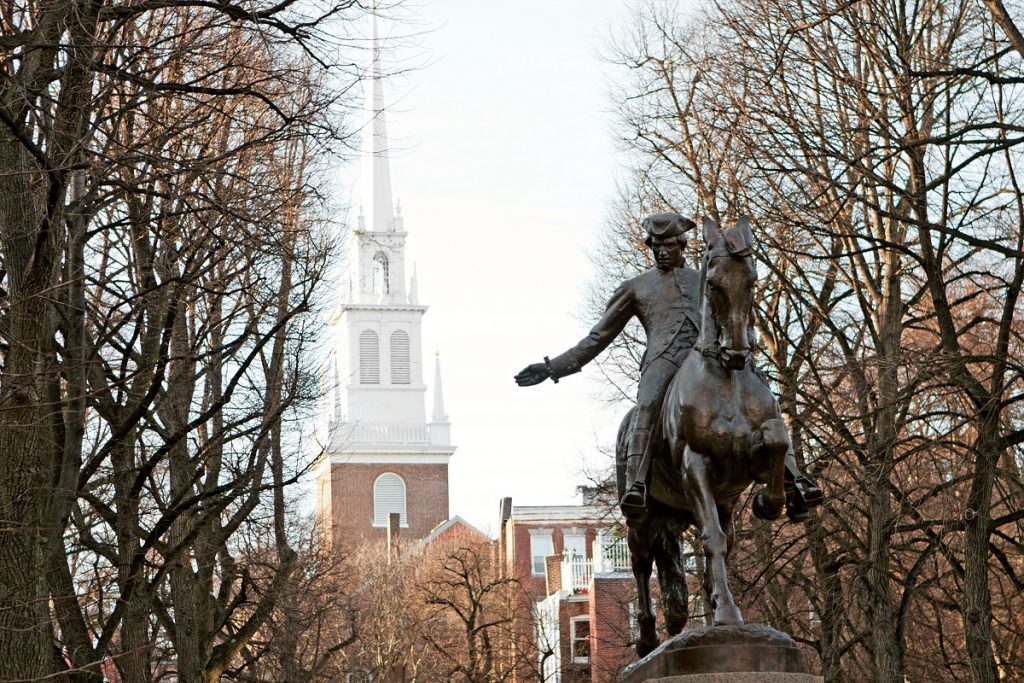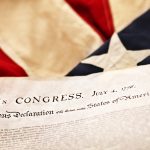This essay is part of a series on Liberalism. See the full collection here.
In yesterday’s essay I argued that Madison and the other Founders did not establish a Hobbesian regime, but rather a republic, the success of which depended on the virtue of its citizens, not the pursuit of their private desires. Today I consider what other texts Deneen can find in support of his broad contention that the first object of government in the Constitution is “the greatest possible differentiation and development of those ‘diverse faculties,” to include “whatever differences” might exist.
The first thing we would have to dismiss is what the Constitution itself says it is for. Did it “form a more perfect Union” for the purpose of disunion? Was its underlying conception of the common good that there is no common good? Everyone gets to do their own thing, based on “whatever differences” there may be?
As skewed as this reading is, it does comport perfectly with, say, Supreme Court Justice Anthony Kennedy’s understanding of the Constitution. He and his ilk certainly hold that the purpose of the Constitution is found in “the priority of inviolable private differences.” As the late Peter Lawler wrote in 2014, “if Patrick [Deneen] is right, and the core of America is nothing more than Lockean individualism working itself out by emptying us out over time, then he has to agree, as a matter of Constitutional law, with the opinions of the Court in Roe and Lawrence.” One must go further and say that Deneen, contra Justices Scalia, Roberts, Alito, and Thomas, must agree even more heartily with Justice Kennedy on the Obergefell decision mandating homosexual marriage. Kennedy had to evoke the mysterious muse of History to justify his mangling of the Constitution. Deneen could have told him that the premise for such radical individualism was there right from the start in Federalist 10.
Start your day with Public Discourse
Sign up and get our daily essays sent straight to your inbox.Deneen uses the word “private” seven times in his reply to me, never approvingly—as in “private differences,” “private things,” and “private pursuits.” These are opposed to the public good. His criticism of Madison’s statement is that “it makes the first object of government the protection of private things,” whereas the classical Greeks “commended the harmonization of differences and cultivation of virtue rather than promoting pursuit of private differences.” In other words, the concentration on private things in the American Founding means, according to Deneen, a lowering of sights from the public good. He says, “The res publica ironically becomes devoted to the protection of individual difference that results in the manifestation of private distinctions.” For Deneen, this clearly represents a moral demotion of what is expected of the political order.
This is a familiar criticism: the American founding sponsored the privatization of the public good and was, therefore, a meaner thing. If the American founding were Hobbesian, this would certainly be true. But something far more important than Hobbes interposed itself between the Greek city-state and eighteenth-century America, as Adam Seagrave rightly notes in his recent reply to Deneen. In my view, the relative primacy of the private came with the advent of Christianity and its affirmation of the inviolable sanctity and intrinsic worth of the individual person made in the imago Dei. Citizenship no longer defined the person, since the state lost its all-encompassing role and status. Christianity forever demoted the res publica and elevated in dignity the private life of man. Nothing has so limited the scope of politics as has Christianity by placing man’s end in the transcendent.
In his 1981 address to members of the German Bundestag, the then-Cardinal Joseph Ratzinger summed up this perspective:
The state is not the whole of human existence and does not embrace the whole of human hope. Men and women and their hopes extend beyond the thing that is the state and beyond the sphere of political activity . . . This kind of politics that declares the kingdom of God to be the result of politics and distorts faith into universal primacy of the political is by its nature the politics of enslavement; it is mythological politics.
This limitation of the political order is really the revolutionary teaching that made the American Revolution possible.
In short, the Founders did not think that the summum bonum could be reached through political means, not because they were Hobbesian (though Hobbes denied the very existence of a summum bonum), but because they were Christian.
In his June 28, 1813, letter to Thomas Jefferson about the basic principles upon which the Founders achieved independence, Adams asked:
And what were these principles? I answer, the general principles of Christianity in which all those sects were united and the general principles of English and American liberty in which all these young men united . . . Now I will avow that I then believed and now believe that those general principles of Christianity are as eternal and immutable as the existence and attributes of God. And that those principles of liberty are as unalterable as human nature . . . I could, therefore, safely say consistently with all my then and present information, that I believe they would never make discoveries in contradiction to these general principles.
His point of view was reinforced by his son John Quincy Adams, who wrote: “The highest, the transcendent glory of the American Revolution was this—it connected, in one indissoluble bond, the principles of civil government with the precepts of Christianity.”
The notions Deneen assigns to the American Founding would find a more congenial home in the ideology of the French Revolution. There indeed one discovers the ideas of the mutability of man’s nature and of his perfectibility, which were foreign to the American Founding.
My Challenge to Deneen
My challenge to Deneen in the Claremont essay was for him not merely to conclude but actually to prove that the Founding was Hobbesian. Deneen needs to do more than assert it, as he does and has done, again and again, without adducing any proof beyond the moral decay of today, sprinkled with the Madison quotes and references to Locke. The superimposition of Hobbes on the Founding may make today’s degeneration more easily understandable to Deneen and others, but it does so at the price of the abundant historical record that says emphatically that this was not so. This is not how the Founders understood themselves or what they were doing. Does Deneen really suppose that they simply substituted one form of absolutism for another? They were adamantly opposed to any form of political absolutism whatsoever.
I suggested how Deneen could advance his cause, challenging him to
prove that the founders held a non- or anti-teleological view of nature. Something like, say, the views of Machiavelli, or Hobbes, or perhaps Hume would do. But then why did the Founders execrate Machiavelli, Hobbes, and, at least some of them, Hume (not Madison, but certainly Jefferson, Wilson, and Adams)? If the American Founding was inspired by Hobbesian ontology, why did it not look like it? The denial of formal and final causality defines Hobbes’s thought and his unlimited Leviathan. If they shared in a similar metaphysical rejection, why did the founders not replicate a Leviathan state? Their government was limited precisely because they did not dismiss either formal or final causality, which they acknowledged in “the Laws of Nature.”
Deneen failed to do this, but he does say that the Founders did produce a Hobbesian state; it just took more than 200 years to show up. He claims their success is measured by today’s depravity. This is like blaming adultery on marriage. If Deneen is right, why are there manifestations of this moral decline everywhere in the Western world, often in more aggravated form than in the United States? Certainly the countries of Western Europe cannot be victims of the American Founding.
Ideas Have Consequences
Now to the issue of deleterious effects, with which Deneen began his reply to me. He claims, “I am accused [by Reilly] of being the only person in America corrupting the youth,” and that I hold him “singularly responsible for corrupting the youth.” He states that the charge is “patent nonsense.” Indeed, it is. But I never made it. In fact, at the same time, Deneen says, “If Reilly is to be believed, Hanby and I are merely two officers in an army of educators who are corrupting the youth.” Well, it can’t be both.
Were it the former, I wouldn’t have bothered addressing the issue. I made clear at the beginning of my Claremont essay that I heard much the same thing at a conference on John Courtney Murray’s thought more than twenty years ago from Professor John A. Guegen. Also, around the time of the bicentennial of the Constitution, a debate similar to ours was taking place between Walter Berns (on the side of Hobbes’s influence on the Founding) and Harry Jaffa (on the opposing side). Years before, Herbert J. Storing spoke of “the tendency, under the principles of the Declaration of Independence, for justice to be reduced to self-preservation, for self-preservation to be defined as self-interest, and for self-interest to be defined as what is convenient and achievable.” So, Deneen need not feel as lonely in his positon as he seems to. They are legion (in fact, add in Thomas Pangle).
Nonetheless, it is curious that Deneen should require evidence of the relatively broad reception of his point of view in the academy when he provides it himself. Each chapter of Conserving America? ends with a brief report on how well-received it was (as a lecture) by the audience, usually of some academic mien or other. Unless it was by the powers of his oratory alone, the audiences must have been in some way predisposed to Deneen’s point of view to accept it so approvingly.
As Deneen knows, ideas, including his own, have consequences. Good ideas would presumably have good consequences, and bad ideas, bad ones. (Hobbes’s ideas were very bad, and so have been the consequences from them.) Deneen cannot claim immunity from what harm his school of thought may cause.
A Way Forward
Here is an example. My oldest son, now serving as a newly minted Marine Corps officer, had a course in American political thought in his last semester at a Catholic university. The exclusive point of view presented by the professor was the same as Deneen’s, though he was not mentioned in the course. My son struggled as best he could against this, but the professor prevailed in convincing the majority of students that the Founding was grievously, morally faulty. Their reaction was captured in a question my son overheard: “okay, then, but what are we supposed to do now?” Deneen should try his hand at answering the same question for those who are convinced by his presentation of the American Founding as Hobbesian. What exactly are they supposed to do now?
Deneen says, “Today . . . too often, who we are accords with our philosophy—evinced, for instance, in the example of today’s liberals being unlikely to serve in the military.” Perhaps Deneen should reflect on his teaching’s effect on those who are willing to serve. Since he thinks the regime is about self-preservation and the promotion of private differences, why should anyone serve it? How would he like to tell a class of Marine Corps second lieutenants that the country to which they have just pledged their lives and honor is morally base at its origins? To the extent to which he is successful in persuading them, what effect does he suppose it would have? This idea has consequences.
Deneen has called for a re-founding on principles better than those at the origin of the United States. What are they? Deneen should rewrite the Declaration of Independence by inserting whatever principle he thinks was absent from the original. He should redo the Constitution by adding whatever institutions he thinks were missing from it so we can see what he means by a re-founding. I’m unaware of Deneen ever addressing these questions. Instead of merely objecting to the American order, Deneen might start proposing what the alternative should look like. Doing so would provide a more fruitful way forward.














